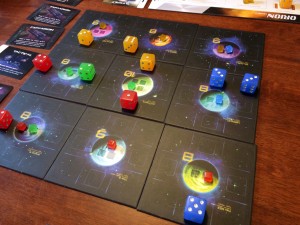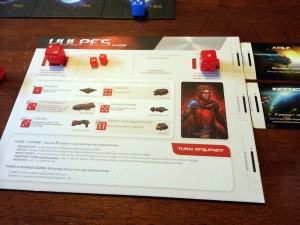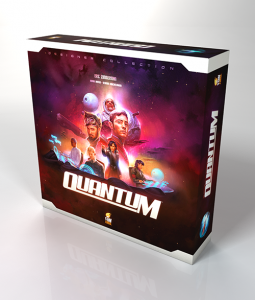Review: Quantum
Posted by James (admin) on April 14th, 2014

Quantum is a light, space-themed game. Players have ships which are represented by dice that travel between the planets trying to colonise them (place cubes on them). The first player to place all their cubes wins.
The ships (dice) are rolled to determine what type of ship they are – a low number means they are slow moving but powerful in combat, and vice versa. (In fact, the dice value is how many spaces they can move which makes things simple.) Each type of ship has a special power too, such as transporting another ship, swapping places, changing a ship’s value and this makes each quite different.
On their turn, a player can take 3 actions. An action can be used to activate a ship (move/attack), re-roll a ship, bring a ship on from the scrap yard, or carry out research. A player can use 2 actions to place a cube on a planet if they have ships next to the planet that add up to the planet’s number and if there is still room to place a cube there. (A player can also place a cube if they win enough combats.)
When a player moves their ship onto an opponent’s ship, a combat is resolved – the attacker and defender roll a dice and add their ship’s value. If the attacker has a lower total then the defender is destroyed (attackers never get destroyed), so ships with lower numbers are better in combat and attacking is risk free (apart from making an enemy of the player you attacked). A defeated ship is moved to the scrap yard so it can be re-launched later, and it is re-rolled to see what type of ship it will be.
If a player placed a cube, or has gained enough research points, they can select one of the cards on display which give either large, immediate effects or lesser, on-going abilities. Cards can allow a player to gain an extra ship, move a ship twice, take another turn, etc. These cards add extra options to players’ tactics and make them slightly different to each other – I always like this sort of asymmetry in a game as it gives players slightly different views of the same situation.
I always have time for Funforge’s games as they’re always really nicely produced and Quantum is no different with sturdy pieces, easy-to-read dice, and player boards that show all the information required.

The player boards have areas for ships in the scrapyard, advance cards and cubes, as well as information on the abilities of each ship type.
Quantum is such a simple game to describe but the game mechanics deliver a great deal of scope for creating cunning combinations. Planning how best to use your 3 actions each turn is usually a rich area for decision-making as players consider how to use the different strengths, weaknesses and abilities of the different ship types combined with their movement; plus, you’re always looking at what other players are doing as they may be a threat to your progress, or may need stopping themselves. There’s a sense of anticipation as each player just wants to get to their next turn, and it feels very interactive. Ships (and plans) can get destroyed quite easily so you need to roll with the punches.
With limited spaces for cubes on each planet, there is a tense and race-like feeling of a land grab – you may have spent several turns moving your ships to place a cube on a planet and this will be ruined if someone takes the last free space you were aiming for. Also, each player can only have 1 of their cubes on any planet so this forces players to move around and you can start to see where your opponents will need to go after they have placed a few cubes already.
The different ships seem well-balanced given the mixes of speed versus strength plus their abilities. The random assignment of type (by rolling the dice) forces players to use ships of all types and that are not ideal; however, this does add an element of luck to the game which can be frustrating. Using an action to randomly re-roll ships that are already on the board is acceptable as it is a limitation of that action; however, I felt like I wanted more control over the types of ships that came out of my scrapyard. During one game, I spent a great deal of actions re-rolling 1 ship in my scrapyard so it could combine with my other ships to make the total number required to place a cube. I kept rolling the same unhelpful numbers over and over so my game stalled which felt disappointing as it was just luck of the dice roll that stopped me. I thought maybe players could tweak the results of ships when they are placed in the scrapyard – this could even be a catch-up mechanism based on how many cubes players have compared to one another, i.e. player with the most cubes remaining gets to tweak their results more than other players. Another option is maybe to use 2 actions to tweak a ship by +/-1 instead of rolling. However, this is more my own preference and not a major negative for the game as Quantum is meant to be a light and fast game so elements of luck are acceptable and should even themselves out.
Speaking of luck, rolling dice for combat involves some luck too of course. I found this to be acceptable because the odds of success are clear and it’s meant to be a light game.
There is no hidden information in Quantum, so all players can see who is currently in the lead and who looks like they’re about to win. This adds a ‘stop the leader’ element to the game of short-lived/unintended alliances which I quite like as this offers a bit of an in-built catch-up mechanism for players who are not doing so well. This means that to win you need often need to get within striking distance and then have a plan as to how to sprint for the finish in one turn – using your actions to leave you one turn from winning is almost certainly going to make you a target if anyone notices. As you only have 3 actions on your turn, finding this cunning combination of actions is an interesting task, especially as it takes 2 of your actions to place a cube. Like most games, you need to watch out for players convincing/misdirecting others that someone is a threat when it’s actually the person who’s doing the convincing.
The board is comprised of 9 square tiles which the main rules show are laid out randomly in a 3×3 grid and this changes where the different planet numbers are. A free list of 30 different tile layouts (most not in a 3×3 grid) was given away at Essen to add some variety in replay – this showed different shape layouts (and different ones for numbers of players too) plus it also explained the principles to ensure any layouts you made yourself would be balanced. This is available as a downloadable file on the BGG page. I always appreciate methods of re-using elements like this as it adds more content without adding more complexity or cost.
To add more optional variety to the game, a few icons like moons could have been placed on 1 or 2 of the spaces around each planets which had some optional special effects. For example, some moons could block movement, or allow a player to +/-1 to a dice if re-rolled whilst there, etc. This isn’t a negative just a nice-to-have item to add a bit of variety across the board and it could be played without them too.
Overall, Quantum is a simple, light and fun space-themed game but which delivers a game that requires you to constantly find cunning ways in which to combine your ships, their abilities and your 3 actions from amongst a wide variety of possibilities. You can find out more and read the rules on Funforge’s website: bga.me/quantum
James.
[Played with 4 players]


